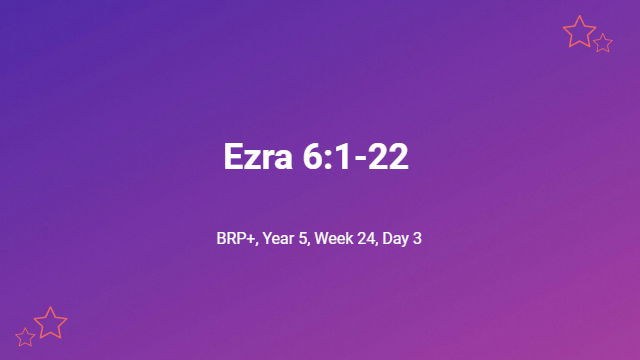Ezra 6:1-22
Q.1. What was the substance of the decree of Cyrus? What instruction did King Darius give on the strength of this edict? How did he support Judah’s efforts? – (Ezra 6:1-12)
Sure enough, when they found the decree of Cyrus, it was exactly as the Jews had claimed. In fact, it contained a description of the measurements of the temple, complete with the offer for Babylon to pay for its reconstruction. Furthermore, all the sacred vessels taken by Nebuchadnezzar were to be returned, in order to refurbish the Temple in Jerusalem (Ezra 6:1-5). So Darius gave a stern warning for Israel’s enemies to not oppose the rebuilding of the temple, but rather to contribute – … the full cost is to be paid to these people from the royal treasury out of the taxes of the provinces beyond the River, and that without delay (Ezra 6:8). Added to this was the command for them to provide everything required for Judah to bring their sacrifices and offerings to God – that they may offer acceptable sacrifices to the God of heaven and pray for the life of the king and his sons (Ezra 6:10). The reversal of fortunes for Judah could not have been more stark.
Q.2. How diligently was the decree of Cyrus carried out? Why was the ministry of the prophets crucial? How was the dedication celebrated? Who was represented at the dedication? – (Ezra 6:13-18)
Darius had specifically detailed the punishment for disobedience to his edict. This ensured that the enemy of God’s people carried out the decree to the letter (Ezra 6:11, 13). They finished building the temple – … through the prophesying of Haggai the prophet and Zechariah the son of Iddo … (Ezra 6:14). God used His prophets to convict the hearts of the settlers. This brought success by the end of the year (i.e. the month of Adar – Ezra 6:15). It provided ample time to celebrate – the sons of Israel, the priests, the Levites, and the rest of the exiles, celebrated the dedication of this house of God with joy – … for the service of God in Jerusalem, as it is written in the book of Moses (Ezra 6:16 & 18). It was expressly stated that this dedication in the temple at Jerusalem involved not just the sons of Judah and Benjamin, but all the sons of Israel (Ezra 6:16). This explains how devout believers from around Israel, such as the prophetess Anna from the northern coastal tribe of Asher, could reside near the temple in the time of Christ (c.f. Ezra 6:21; Lk.2:36-38).
Q.3. How did the Passover celebration unify the nation? What condition applied to the partakers of the feast? What caused the people to rejoice? – (Ezra 6:19-22)
Though the priests from the line of Aaron dwelt around the temple in Judah, God designated forty-eight cities throughout the twelve tribes of Israel (Jos.21:1-42). First, the returning priests prepared themselves – For the priests and the Levites had purified themselves together; all of them were pure. Then they slaughtered the Passover lamb for all the exiles, both for their brothers the priests and for themselves (Ezra 6:20). The priesthood sought to turn the hearts of the twelve tribes back to God, to enable all – the sons of Israel who returned from exile and all those who had separated themselves from the impurity of the nations of the land to join them, to seek the Lord God of Israel, and eat the Passover (Ezra 6:21). The resumption of this feast, and the surrounding circumstances, were the source of much thanksgiving – … for the Lord had caused them to rejoice and had turned the heart of the king of Assyria toward them to encourage them in the work of the house of God, the God of Israel (Ezra 6:22). It is always special when God breaks into our lives and ministries, in order to show His grace and power.

